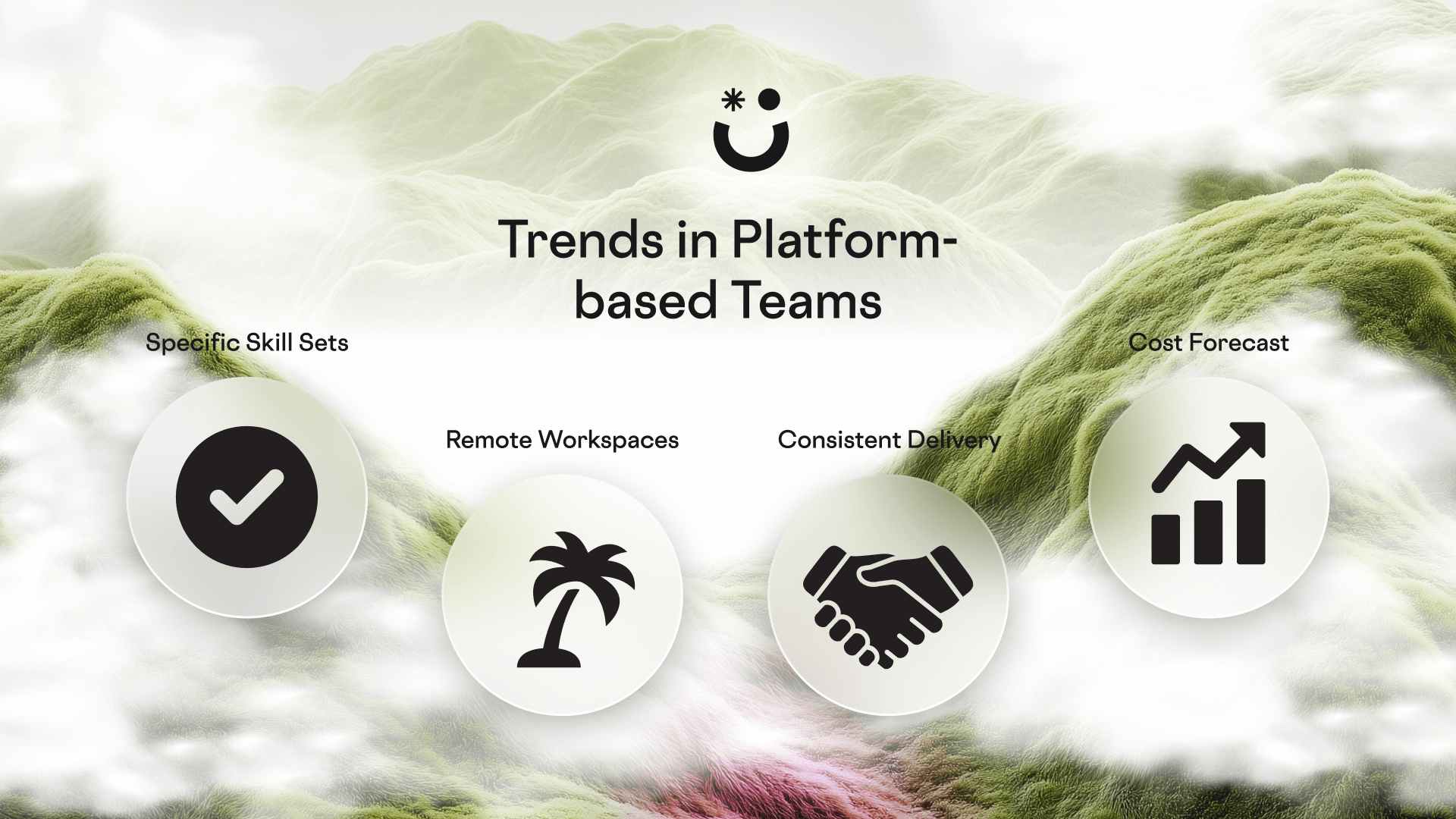Why Founders Are Leaving Freelance Marketplaces for Platform-Based Teams

.png)
Startup founders are increasingly moving away from traditional freelance marketplaces to build their teams.
Traditional freelancing platforms, such as Upwork and Fiverr, offer easy access to a vast pool of freelancers and experts. Many founders, however, have encountered challenges ranging from inconsistent quality to time-consuming vetting processes to finding the right freelancer to integrate into their company.
A new alternative is starting to gain traction with fast-moving founders: subscription-based talent services that provide platform-based teams. These are vetted experts ready to work as an extension of your company, and you get quick access, almost instant, to them via a subscription.
This shift reflects a broader change in how startups approach hiring and project execution, with a greater emphasis on reliability and efficiency. Another aspect is that it’s a subscription model, which, according to a 2024 SEI report, shows 3.4 times faster growth rates than the S&P 500 over the past 12 years.
In this article, we’ll examine why founders are making this switch, the benefits and trade-offs of platform-based teams, and the key trends driving this talent strategy revolution.
Challenges with freelance marketplaces for founders

Freelance marketplaces have revolutionized access to talent, but they come with trade-offs that many startup leaders find frustrating. For instance, only 30% of employers are aware of the risks associated with misclassification of a freelance worker. Another major pain point is the significant time investment required.
Founders can often spend hours sifting through profiles, proposals, and reviews to find a suitable freelancer. Even after hiring, ensuring the freelancer understands the project scope and brand context can add delays if you don’t have a robust onboarding process in place.
According to recent surveys, a majority of business owners report difficulty vetting freelancers and inconsistent work quality on these open platforms. A founder noted that using freelancers instead of internal team members led to over 3x times the amount of revisions.
Managing a rotating cast of freelancers also means handling multiple contracts, invoices, and communication channels.
The fragmented process is what can distract founders and key decision-makers from core business tasks, especially when projects scale and require a cohesive team rather than isolated contributors working on separate tasks.
What are platform-based teams?
Platform-based teams are an emerging solution designed to address the shortcomings of one-off freelance hiring, namely cost, time, consistency, quality, and even regulatory issues.
The concept is simple: instead of hiring individual freelancers for each task, a founder subscribes to a service that delivers a dedicated, vetted team through an online app or marketplace.
For example, Awesomic is a subscription-based design service that assigns vetted professionals to tasks or projects of your company; they’re available on-demand via the app.
These services function as a talent-matching app that quickly pairs your project needs with a reliable team or professionals, often including project managers or account managers to streamline workflows.
In essence, subscription-based talent matching combines the convenience of a marketplace with the accountability and consistency of an in-house team, as it’s in their best interest to keep you subscribing month after month.
Benefits of platform-based teams for startups
For founders shifting away or looking for alternatives to freelance marketplaces, platform-based team services offer several key benefits:
- Vetted quality: Providers thoroughly screen and test their talent, so founders get access to high-quality professionals without wading through hundreds of profiles. This raises the baseline quality and reliability from day one. At Awesomic, for instance, a founder would match with senior-level talent and the top 0.82% of total applicants.
- Faster onboarding: Because the matching happens on the app or platform, it’s usually already with professionals who need minimal onboarding due to industry expertise. The support team is standing by, and projects can kick off in days or even hours, whereas onboarding an individual freelancer might take weeks, especially if you consider that you also need to find the right person.
- Integrated teamwork: A platform-based team is more than a collection of freelancers; it's a coordinated unit, and pros within these apps are used to working solo with clients as well. Members are accustomed to working under a unified process, ensuring better communication and consistency throughout a project. At Awesomic, all pros are required to report updates at least every 24 hours, and clients can request as many revisions as needed to their project with no additional cost.
- Simplified management: Rather than juggling separate freelance contracts and payments, founders deal with a single subscription and a dedicated account manager or app interface. This one-stop management streamlines administrative processes, reducing overhead and freeing up time so founders can focus on what truly matters, rather than being bogged down by red tape.
- Predictable costs: Subscription talent services typically charge a flat monthly, quarterly, or yearly fee. Startups can budget knowing exactly what they'll pay, avoiding surprise costs from hourly overruns or project creep that can happen with outsourced freelancers and agencies.
Key trends driving the shift to platform-based teams

The move from open marketplaces to subscription-based team models isn't happening in a vacuum. Several broader trends are contributing to this shift:
- Quality, not quantity: After years of experimenting with massive freelancer pools, startups are prioritizing consistent quality. Founders have grown weary of sorting through dozens of applications per role, and many now prefer a smaller, curated talent pool provided by a managed service.
- Rise of subscription models: The success of subscription-based software (SaaS) has spilled over into the talent world. Investors and industry analysts note a growing demand for “talent-as-a-service” offerings. In design, marketing, and development, companies are signing up for monthly talent subscriptions that ensure help is always available when needed. This steady adoption, alongside projected growth to exceed $100B in valuation by 2034, indicates that the model is proving its value.
- Remote work normalization: The COVID-19 pandemic firmly established remote collaboration. Now, whether a team member is a contractor or part of an external partner agency matters less, as long as they can integrate via Slack, Zoom, and other tools. Founders are more comfortable than ever managing distributed teams, making the switch to a platform-based team feel seamless.
- Founder frustration with gig platforms: There’s a growing chorus of startup founders publicly sharing why they've moved on from freelance marketplaces. Common complaints include unpredictable quality, lack of accountability, and difficulty building long-term knowledge with one-off freelancers. These shared experiences fuel interest in alternatives that promise a more reliable, long-term partnership.
Pitfalls and tradeoffs to consider

Of course, no solution is perfect, and founders should be aware of potential tradeoffs when switching to a platform-based team service. One consideration is commitment: subscription services usually require a monthly fee, so you'll want to ensure you have a steady flow of work to justify the cost. Some also require an annual payment up front, while others don’t.
If your workload is sporadic or one-time, paying for a subscription may exceed your needs. Additionally, not all platform-based services offer every skill set imaginable. You might find an amazing design subscription, for instance, but still need a specialized developer elsewhere. It's essential to assess whether a service’s talent pool aligns with your specific needs.
Finally, while these services reduce management burden, you'll still need to onboard the external professional matched into your company’s style and processes. Allocate some time initially to get the team acquainted with your product and expectations while delivering thoughtful feedback; that investment will pay off in smoother collaboration.
By being mindful of these factors, a founder can mitigate most pitfalls and fully leverage the benefits of a subscription talent model.
How to get started with a platform-based team
If you’re considering making the switch, here are a few steps to get started:
1. Assess your needs: Outline the types of projects and volume of work you have. This will determine the type of subscription (design, development, marketing, etc.) and the level of service you require (project managers, account managers, senior-level oversight, etc.).
2. Research providers: Look into reputable platform-based talent services that specialize in your industry or the skill set gap you’re trying to fill. Compare their talent vetting process, pricing plans, and reviews or case studies from similar startups and companies.
3. Start with a pilot: Begin with a one-month engagement into a less risky but still high-impact project to see how well the team integrates with your workflows. Use this time to set communication norms and project management tools. If it’s a good fit, you can confidently roll into a longer-term subscription like Perseus Defense (YC S25) has done with Awesomic.
By taking these steps, founders can smoothly transition from ad-hoc freelance hiring to a more scalable, managed team model.
The future of startup hiring
The talent acquisition landscape is evolving. Freelance marketplaces are not disappearing—they still serve a purpose for many one-off tasks and offer a vast talent selection. However, the growth of platform-based team services signals a significant shift in how startups approach building their extended teams.
We may see traditional freelance platforms introduce more managed service options or hybrid models to keep up with this trend. For founders, the key is having the right tool for the job.
In the coming years, the most successful startups will likely be those that strategically blend different talent sources: using marketplaces for niche or occasional needs, but relying on subscription-based teams for core, ongoing work where consistency and speed matter most to free up their internal teams to work on high-level, impactful projects.
The bottom line
Founders are moving from freelance marketplaces because they need a faster, more reliable way to build and scale their teams. Platform-based teams fill that need by delivering vetted talent through a convenient subscription model.
This approach isn't just a trend—it's a strategic evolution in how work gets done at startups, fast-growing companies, scaleups, unicorns, and even enterprises. Awesomic has already helped over 4,000 companies complete over 14,000 projects, like WillowAI which recently received $4M+ in investments.
If you’re ready to explore how a subscription talent service can serve your company, take a look at Awesomic and its offerings. You might discover that a dedicated talent partner is just a click away, so book your personalized demo and get ready to propel your growth forward.
One subscription and your hiring problems solved


FAQ

Awesomic is a revolutionary app that matches companies with vetted professionals across 30+ skill sets, from design and development to marketing and product. Based in San Francisco with a global core team, we offer a faster and more flexible alternative to traditional hiring through a subscription-based model. Awesomic delivers high-quality talent on demand, without the delays of recruiting.

We function as a subscription-based service that matches you to top-tier, vetted talent. Submit a project in just a few clicks and start receiving deliverables in as little as 24 hours. Scale your Awesomic plan up or down as your business needs change.

Every Awesomic subscription comes with unlimited revisions. You receive daily progress updates via the app, and you can provide feedback or request iterations as needed. If your project requires a different approach, you can request a talent rematch at any time, at no extra cost. You can also add teammates to collaborate and streamline feedback

A talent marketplace is a platform that utilizes data and intelligent matching algorithms to connect professionals with projects based on their skills, experience, and availability. While often used internally by large companies, Awesomic applies this model at scale, matching vetted global talent to your most critical business needs.

Hiring is time-consuming, expensive, and risky. Awesomic eliminates that problem. We rigorously vet all talent for technical ability, communication, and soft skills, ensuring only senior-level professionals work on your projects. You skip the job posts, interviews, and delays, and get straight to results.

No, Awesomic goes beyond design. While many clients utilize us for branding, UI/UX design, or motion graphics, we also provide vetted talent in no-code web development, product design, marketing, and more. Think of us as an extension of your team. A flexible, high-performing creative partner from planning to execution, whether you're building awesome products or scaling your team.

You can talk directly with your matched talent via the Awesomic app, connect via Slack, email, or schedule video calls. No matter the plan, you’ll receive daily updates in the app for every active task. You can also tag us in for any issues through our in-app customer chat.












